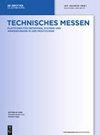多传感器数据融合的人工智能驱动系统展望
IF 0.7
4区 工程技术
Q4 INSTRUMENTS & INSTRUMENTATION
引用次数: 1
摘要
人工智能自动化不仅对传感器技术产生影响,而且对辅助态势感知和决策的综合多传感器系统产生影响。例如,对于集成的有人-无人-组队(MuM-T)来说尤其如此。从不排除国防领域应用的系统工程角度来看,需要完成三个任务:(1)设计人工智能自动化,使人类在精神上和情感上能够掌握每种情况。(2)确定技术设计原则,以促进在道德关键应用中负责任地使用人工智能。(3)保证人类决策者始终具有充分的信息优势、决策优势和行动选择优势。我们对人工智能驱动的多传感器数据融合系统的讨论产生了建议和关键结果。我们正在处理所需的算法、需要处理的数据、所需的编程技能、要使用的计算设备、不可避免的以人类为中心的设计、对必要的研发工作的审查,以及从系统的角度对不同维度的整合。本文章由计算机程序翻译,如有差异,请以英文原文为准。
Perspectives on AI-driven systems for multiple sensor data fusion
Abstract Artificially intelligent automation has not only impact on sensor technologies, but also on comprehensive multiple sensor systems for assisting situational awareness and decision-making. This is particularly true for integrated Manned-unManned-Teaming (MuM-T), for example. From a systems engineering perspective which does not exclude applications in the defence domain, three tasks need to be fulfilled: (1) Design artificially intelligent automation in a way that human beings are mentally and emotionally able to master each situation. (2) Identify technical design principles to facilitate the responsible use of AI in ethically critical applications. (3) Guarantee that human decision makers always have full superiority of information, decision-making, and options of action. Our discussion of AI-driven systems for multiple sensor data fusion results in recommendations and key results. We are addressing the algorithms needed, the data to be processed, the programming skills required, the computing devices to be used, the inevitable anthropocentric design, the reviewing of R & D efforts necessary, and the integration of different dimensions in a systems-of-systems point of view.
求助全文
通过发布文献求助,成功后即可免费获取论文全文。
去求助
来源期刊

Tm-Technisches Messen
工程技术-仪器仪表
CiteScore
1.70
自引率
20.00%
发文量
105
审稿时长
6-12 weeks
期刊介绍:
The journal promotes dialogue between the developers of application-oriented sensors, measurement systems, and measurement methods and the manufacturers and measurement technologists who use them.
Topics
The manufacture and characteristics of new sensors for measurement technology in the industrial sector
New measurement methods
Hardware and software based processing and analysis of measurement signals to obtain measurement values
The outcomes of employing new measurement systems and methods.
 求助内容:
求助内容: 应助结果提醒方式:
应助结果提醒方式:


